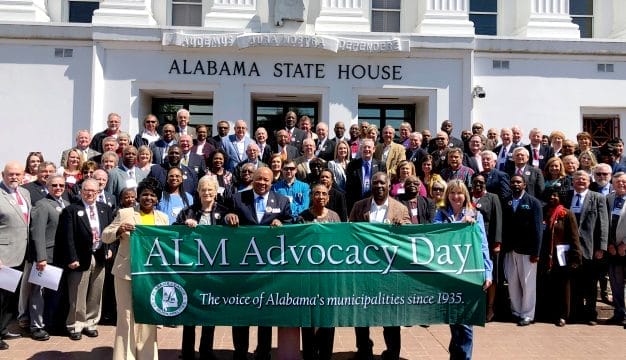Courtview and the Foster Family
George Washington Foster (1806-1878) was a wealthy industrialist, planter, and philanthropist in Florence, Lauderdale County. He is also notable for building Courtview, his large and extravagant home that is now Rogers Hall at the University of North Alabama (UNA). One of his daughters, Sallie Independence Foster, kept diaries during the American Civil War that are significant for their detailed depictions of life on the home front during the conflict.
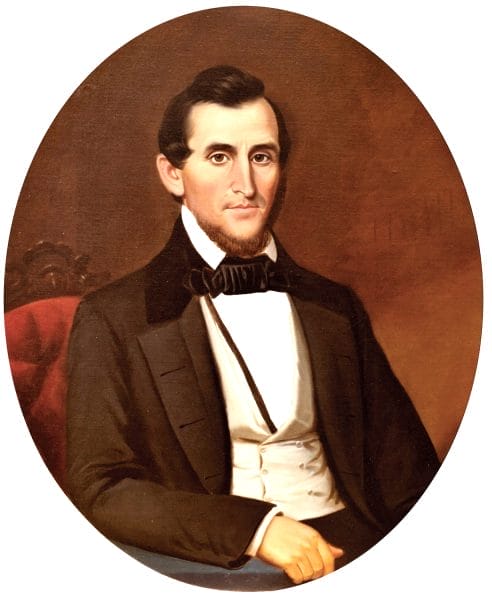 George Washington Foster Portrait
Foster was born to Robert Coleman Foster and Ann Slaughter Hubbard Foster on November 28, 1806, in Nashville, Tennessee. In 1829, he married Sarah Independence Watkins, with whom he would have seven children. The daughter of Robert and Prudence Watkins, Sarah and her family had lived in Georgia until 1821, when they moved to Lauderdale County. Primarily a plantation owner, Foster’s holdings in Lauderdale County alone included 6,281 acres and 100 enslaved people by 1860. His crops included grass seed, cotton, corn, and wheat, and his livestock holdings included horses, mules, oxen, sheep, and hogs. The plantation also produced butter. In addition to Courtview, Foster owned Woodland Plantation in a section of Lauderdale County known at the time as Colbert Reserve, as well as a plantation named Oak Grove near Courtland, Lawrence County.
George Washington Foster Portrait
Foster was born to Robert Coleman Foster and Ann Slaughter Hubbard Foster on November 28, 1806, in Nashville, Tennessee. In 1829, he married Sarah Independence Watkins, with whom he would have seven children. The daughter of Robert and Prudence Watkins, Sarah and her family had lived in Georgia until 1821, when they moved to Lauderdale County. Primarily a plantation owner, Foster’s holdings in Lauderdale County alone included 6,281 acres and 100 enslaved people by 1860. His crops included grass seed, cotton, corn, and wheat, and his livestock holdings included horses, mules, oxen, sheep, and hogs. The plantation also produced butter. In addition to Courtview, Foster owned Woodland Plantation in a section of Lauderdale County known at the time as Colbert Reserve, as well as a plantation named Oak Grove near Courtland, Lawrence County.
Foster was part-owner of several business ventures as well. He and his brother Thomas Jefferson Foster established a cotton factory in 1845. Located on Shoal Creek, it was also near the portion of Jackson’s Military Road that ran through a community known as Happy Hollow. By 1860, they had sold the plant. In the 1850s, Foster entered into business with another sibling, Benjamin Franklin Foster. Together, they owned the Florence Woolen Mill, also known as the Foster Woolen Mill, which was located on the southwest corner of Court and Alabama Streets in Florence and closed in 1859. Foster was also owner of a mill at Woodland, which was burned during the Civil War by forces under U.S. Army colonel Jesse J. Phillips.
Foster made several prominent contributions to civic life in the city of Florence. Most notable was his $10,000 donation to what would become Florence Wesleyan University. This vast sum covered a third of the total cost of constructing Wesleyan Hall, the first building on the campus. Foster was one of the original trustees of Florence Wesleyan University and served as president of the Board of Trustees following the Civil War. He was an advocate of education and made a sizable endowment to the college for mathematics instruction. He also contributed heavily to the Methodist Church in Florence, of which he was a member.
Foster did not serve in the Civil War, but his sons Watkins “Wat,” Andrew Jackson “Jack,” and George “Wash” Washington Jr. each joined the Confederate Army and survived the conflict. Federal and Confederate officers occupied Courtview more than once during the war. Federal troops were responsible for the theft of many chickens, geese, and other items from the Foster household. On August 22, 1862, George Washington Foster was arrested by U.S. Army forces and taken to Tuscumbia, where he and several other men from Florence were held at an old tavern. He was allowed to return home on August 28 after his son, Watkins, offered to serve time in his place. The ordeal took a toll on Foster’s health, but he recovered after a short time. Foster spent most of the war at his plantations, while his wife and family stayed at Courtview. Foster died on December 4, 1878, and is buried in the Florence Cemetery.
Courtview
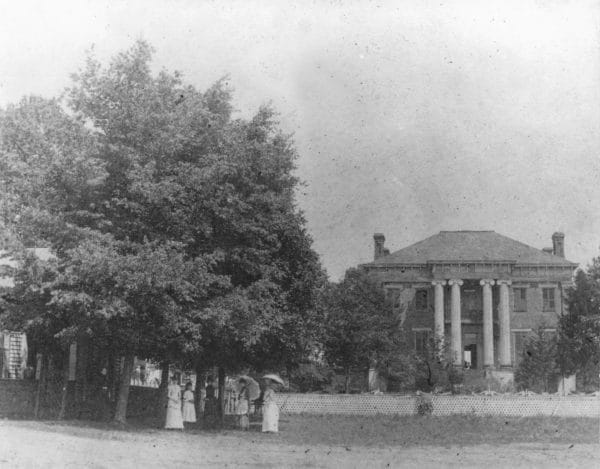 Courtview
Courtview is a brick Greek Revival-style mansion that some historians believe was designed by Adolphus Heiman, an architect from Nashville, Tennessee. The front exterior of the home features a Grecian portico supported by white columns. The original interior featured white walls, white woodwork, and marble mantles for the fireplaces. The house had hot and cold running water when it was built because of a fountain that originally stood in the center of the front yard. The family stored water in a tank positioned on top of the house that was invisible from the ground.
Courtview
Courtview is a brick Greek Revival-style mansion that some historians believe was designed by Adolphus Heiman, an architect from Nashville, Tennessee. The front exterior of the home features a Grecian portico supported by white columns. The original interior featured white walls, white woodwork, and marble mantles for the fireplaces. The house had hot and cold running water when it was built because of a fountain that originally stood in the center of the front yard. The family stored water in a tank positioned on top of the house that was invisible from the ground.
When Foster decided to build a home in Florence, he chose the top of a rise in the middle of Florence’s main street, Court Street. The view of the downtown area was excellent, but city officials objected to the idea. Foster took his request to the Alabama State Legislature and suggested that traffic could be rerouted around either side of his property, and offered to pay for the street construction. The state legislature granted his request, with the stipulation that the house had to be grand enough to deserve the location. Foster paid $300 for a section of North Court Street, and the home was constructed in 1854.
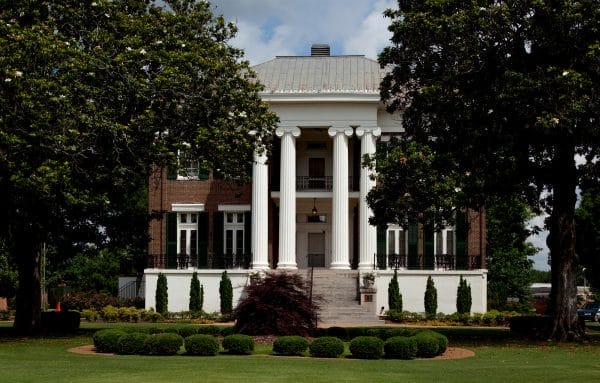 Rogers Hall
Courtview passed to Foster’s daughter Sallie after his wife Sarah died in 1887. Following the deaths of Sallie and her husband, Courtview became the home of Emmet O’Neal and his family in 1900. The son of Gov. Edward A. O’Neal, Emmet O’Neal was the 36th governor of Alabama and a resident of Lauderdale County. He was elected governor in 1911, and served two terms. Following the O’Neals’ departure, the home was purchased by Thomas M. and Alberta Rogers in 1922. The Rogers family renovated the house and sold it to Florence State Teachers College (present-day UNA) in 1948. Dedicated to local history, the Susan K. Vaughn Museum was located on a floor of the mansion for several years, but was removed in 1968. Many items from the museum are now housed at Pope’s Tavern and Museum in Florence. Located at 500 North Court Street in Florence, Courtview is now known as Rogers Hall and was listed on the National Register of Historic Places in 1974. The structure also was documented by the New Deal-era Historic American Buildings Survey program in the 1930s. The UNA offices of University Advancement, University Communications and Marketing, Alumni Relations, and the University Foundation are currently located in the building.
Rogers Hall
Courtview passed to Foster’s daughter Sallie after his wife Sarah died in 1887. Following the deaths of Sallie and her husband, Courtview became the home of Emmet O’Neal and his family in 1900. The son of Gov. Edward A. O’Neal, Emmet O’Neal was the 36th governor of Alabama and a resident of Lauderdale County. He was elected governor in 1911, and served two terms. Following the O’Neals’ departure, the home was purchased by Thomas M. and Alberta Rogers in 1922. The Rogers family renovated the house and sold it to Florence State Teachers College (present-day UNA) in 1948. Dedicated to local history, the Susan K. Vaughn Museum was located on a floor of the mansion for several years, but was removed in 1968. Many items from the museum are now housed at Pope’s Tavern and Museum in Florence. Located at 500 North Court Street in Florence, Courtview is now known as Rogers Hall and was listed on the National Register of Historic Places in 1974. The structure also was documented by the New Deal-era Historic American Buildings Survey program in the 1930s. The UNA offices of University Advancement, University Communications and Marketing, Alumni Relations, and the University Foundation are currently located in the building.
Sallie Independence Foster
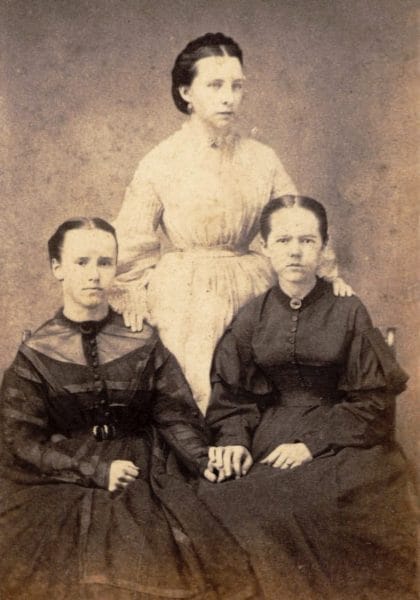 Sallie Independence Foster, 1867
Sallie Independence Foster was born on October 28, 1848, in Nashville, Tennessee, and was the youngest child of Sarah Independence Watkins and George Washington Foster. From the age of seven she lived at Courtview, where she returned after a few years of marriage with children of her own. Sallie’s best friend during her childhood was Julia O’Neal, the daughter of Alabama governor Edward A. O’Neal.
Sallie Independence Foster, 1867
Sallie Independence Foster was born on October 28, 1848, in Nashville, Tennessee, and was the youngest child of Sarah Independence Watkins and George Washington Foster. From the age of seven she lived at Courtview, where she returned after a few years of marriage with children of her own. Sallie’s best friend during her childhood was Julia O’Neal, the daughter of Alabama governor Edward A. O’Neal.
Sallie kept two diaries between 1861 and 1887 that offer insight into life in Florence. Her first diary begins in June 1861, when she was 12 years old. Although this diary does not mention the Civil War often or with much detail, her later diary (1862-1887) discusses the movement of Confederate and federal troops in Florence. Other subjects covered in her diaries include trips to visit Florence area stores, doctors, and people, as well as church. These diaries and a composition book that Sallie used for school are now a part of the Sallie Independence Foster Collection at the University of North Alabama Archives and Special Collections.
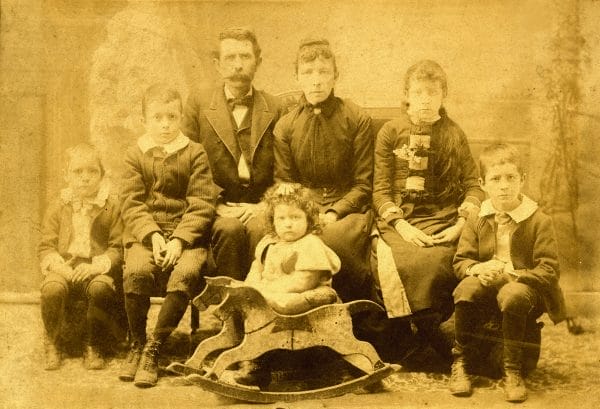 Sallie Independence Foster and Family
Sallie graduated from the Florence Synodical Female College, a Presbyterian school for young women, in 1867. On February 9, 1870, she married Sterling Paine McDonald, who had been a boarder in the family home while he was a student at LaGrange College in Florence; the couple would have six children. The family moved to Arkansas for several years, but returned to Florence to visit her family many times. The family moved into Courtview in 1886. Sallie’s mother died in January 1887, and Sallie became the owner of the house, where she remained with her husband until their deaths. Sterling McDonald was sick for many years and died on April 4, 1897, and Sallie Independence Foster McDonald died eight months later on December 2.
Sallie Independence Foster and Family
Sallie graduated from the Florence Synodical Female College, a Presbyterian school for young women, in 1867. On February 9, 1870, she married Sterling Paine McDonald, who had been a boarder in the family home while he was a student at LaGrange College in Florence; the couple would have six children. The family moved to Arkansas for several years, but returned to Florence to visit her family many times. The family moved into Courtview in 1886. Sallie’s mother died in January 1887, and Sallie became the owner of the house, where she remained with her husband until their deaths. Sterling McDonald was sick for many years and died on April 4, 1897, and Sallie Independence Foster McDonald died eight months later on December 2.
Further Reading
- McDonald, William Lindsey. A Walk through the Past: People and Places of Florence and Lauderdale County, Alabama. Florence, Ala.: Bluewater Publications, 2003.
- Steen, Robert S. History of Foster House, Courtview, Rogers Hall and Early City of Florence. Florence: University of North Alabama, 2006.

